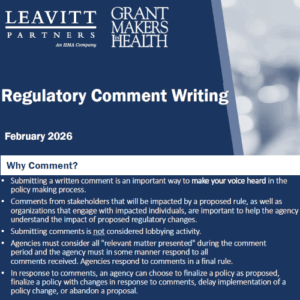Policy Resource: Regulatory Comment Writing
This resource provides an overview of how to write and submit a regulatory comment to the federal register.
For the Benefit of All: Ensuring Immigrant Health and Well-Being
This Issue Brief explores the unique health, social, and policy issues that affect immigrant populations; it looks at attitudes toward immigration and how these influence support for social programs and the provision of public benefits; it highlights philanthropic activities to improve health care access and coverage for immigrants and their families; and discusses how grantmakers are working to ensure the health and well-being of immigrants in their communities.
In Harm’s Way: Aiding Children Exposed to Trauma
Every year, thousands of children nationwide experience trauma as a result of exposure to violence, abuse, natural disasters, severe illness or injury, loss of loved ones due to violence or accident, or forced relocation. This exposure can have both immediate and long-term effects on children’s health and their ability to function fully in their families, schools, and communities. This Issue Brief focuses on the needs of children exposed to trauma, strategies for early identification and intervention, and ensuring the provision of timely and appropriate services to them and their caregivers.
Building a Healthier Future: Partnering to Improve Public Health
GIH’s latest Issue Brief Building a Healthier Future: Partnering to Improve Public Health combines the conversation of a one-day Issue Dialogue with a background paper to identify significant opportunities for grantmakers to partner with public health agencies at the local, state, and national levels, as well as with organizations outside of the traditional public health system, such as faith-based communities, employers, and community organizations. Specifically, this document will help further grantmaker efforts to build and sustain public health partnerships.
In Harm’s Way: Aiding Children Exposed to Trauma
Every year, thousands of children nationwide experience trauma as a result of exposure to violence, abuse, or disasters. These traumatic events create intense stress that threatens children’s mental health and well-being. Fortunately, early intervention and access to appropriate treatment services can ameliorate the immediate and long-term effects of exposure to trauma.
Considering Quality: Engaging Consumers to Make Better Health Decisions
Given information and opportunity, consumers can play an important role in improving health care quality and the responsiveness of the health system to their needs. Whether they are making decisions about choosing a health plan, a particular provider, a course of treatment, or how to incorporate healthy choices into their daily lives, empowered and engaged consumers can be a potent force for change.
For the Benefit of All: Ensuring Immigrant Health and Well-Being
Immigrants and their families contribute to the diversity and economy of the nation, contributing to vibrant, productive, and healthy communities. Yet, immigrants face several barriers to health and well-being. Some result from being disproportionately low income and uninsured; others are unique, such as cultural and linguistic barriers; limited eligibility for public benefits; and bearing the brunt of unwelcoming public views, attitudes, and policies.
Agents of Change
This resource portfolio is from GIH’s 2005 annual meeting, Agents of Change: Health Philanthropy’s Role in Transforming Systems.
Join & Become a GIH Funding Partner Today!
Click here to learn more about becoming a GIH Funding Partner and joining the largest national network of health funders.

